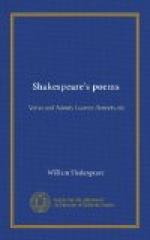|
This section contains 6,242 words (approx. 21 pages at 300 words per page) |

|
SOURCE: "Towards a Reconsideration of Shakespeare's Adonis: Rhetoric, Narcissus, and the Male Gaze," in Studia Neophilologica, Vol. 68, No. 2, 1996, pp. 195-204.
In the following essay, Cousins examines Shakespeare's use of rhetoric in characterizing Adonis, seeing him as an anti-Narcissus figure who is the object of a voyeuristic male sexual desire.
Shakespeare's Adonis, like his Venus, has been primarily studied either in terms of Renaissance thinking about myth and symbol or as if a character in a play. Study in the first mode has connected Adonis with, for example, the idea of beauty's transience, a connection that has been interestingly explored.1 Study in the second mode has closely traced his responses to Venus' sexual aggression, examining his evasions, his defiances, and so on.2 In what follows (and so in parallel to my discussion of Venus), both familiar critical approaches are used but new arguments about Adonis' characterization are put forward...
|
This section contains 6,242 words (approx. 21 pages at 300 words per page) |

|


